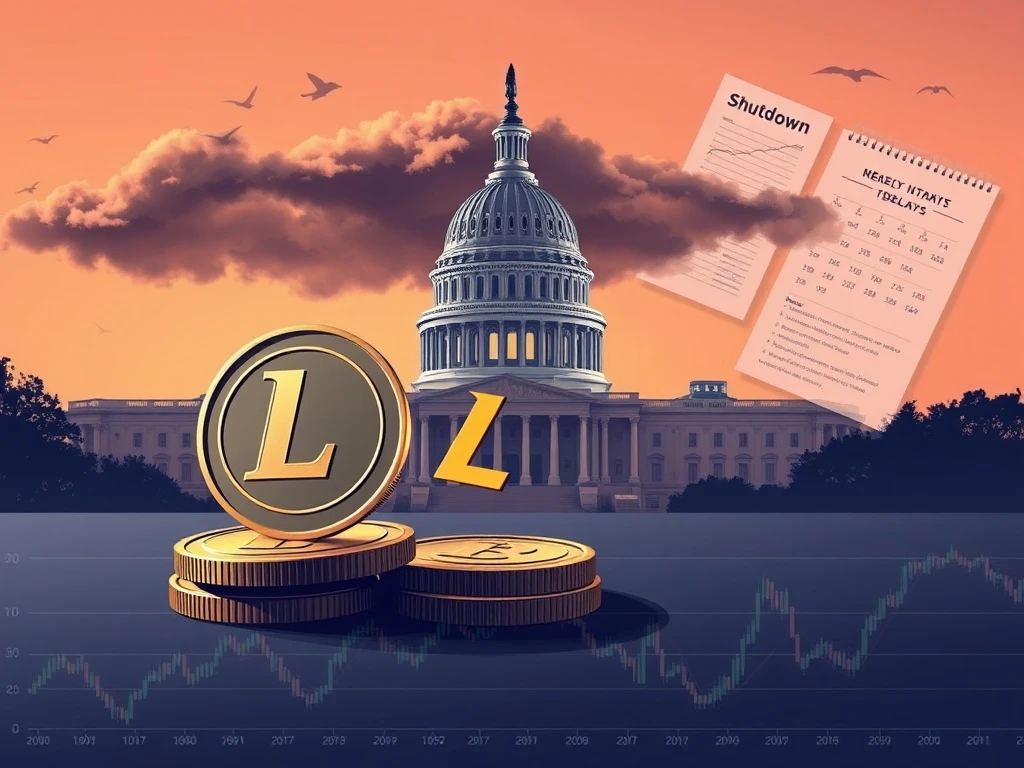Anticipation Builds: Litecoin and HBAR ETFs Poised for Approval Despite Government Shutdown Delays

The cryptocurrency market is buzzing with anticipation. Asset manager Canary Capital stands at the threshold of a significant milestone. Its spot **Litecoin ETF** and **HBAR ETF** filings appear ready for final approval. However, a looming challenge has emerged. The ongoing US government shutdown introduces unexpected delays, casting a shadow of uncertainty over their immediate launch. This situation keeps investors and analysts keenly observing the regulatory landscape.
Approaching Approval: Litecoin and HBAR ETFs at the Goal Line
Canary Capital has seemingly completed the necessary steps for its spot Litecoin (LTC) and Hedera (HBAR) exchange-traded funds (ETFs). The firm recently filed key amendments for both funds. These updates included a specified fee of 0.95% and unique tickers: LTCC for Litecoin and HBR for Hedera. Bloomberg ETF analyst Eric Balchunas noted these additions. He described them as “typically the last thing updated [before] go-time.” This statement highlights the advanced stage of the applications.
Fellow Bloomberg ETF analyst James Seyffart echoed this sentiment. He believes these amendments signal a strong likelihood of approval. Seyffart commented that it “feels like Litecoin and HBAR ETFs are at the goal line here.” These expert opinions suggest the products are technically prepared for market entry. However, the current governmental impasse means the official **SEC approval** remains in limbo. The Securities and Exchange Commission, operating with a minimal staff during the shutdown, cannot process these final decisions efficiently.
Understanding the Fees: Comparing Altcoin and Bitcoin Crypto ETFs
The proposed 0.95% fee for Canary Capital’s Litecoin and HBAR ETFs has drawn attention. This figure appears notably higher when compared to existing **spot Bitcoin ETF** fees. According to Ledger, average fees for spot Bitcoin ETFs typically range between 0.15% and 0.25%. This difference is substantial. Despite the higher cost, Balchunas offers a pragmatic perspective. He explains that such fees are “pretty normal” for nascent and increasingly niche asset classes entering the ETF space. New products often carry higher initial costs due to less competition and the pioneering effort involved.
However, the market dynamics could shift quickly. If the Litecoin and HBAR ETFs attract significant investor interest and substantial capital flows, competition will likely emerge. Other issuers could introduce similar products with lower fees. This scenario would pressure Canary Capital to adjust its pricing strategy. Ultimately, market demand and competitive offerings will shape the long-term fee structure for these altcoin-backed investment vehicles.
The Impact of Government Shutdown on Crypto ETF Approvals
The US government shutdown, which commenced on October 1st, has created significant uncertainty for the cryptocurrency industry. This period was initially slated for a flurry of new crypto ETF approvals. The SEC had deadlines for final decisions on 16 crypto ETFs throughout the month. Now, these crucial timelines are passing without action. The SEC announced it would continue limited operations with a “skeleton crew.” This means essential regulatory reviews, including those for the **Litecoin ETF** and **HBAR ETF**, are effectively stalled.
In September, new listing standards were introduced. These standards aimed to streamline spot crypto ETF approvals. They intended to reduce the need for individual assessments, potentially expediting approval timelines. However, the current **government shutdown** has negated these potential efficiencies. The delay affects not only Canary Capital’s filings but also a broader range of pending applications. This situation underscores the significant influence of regulatory and political stability on the crypto market’s development.
The Surge in Leveraged 3x ETFs: A “Spaghetti Cannon” Approach
Despite the regulatory gridlock caused by the government shutdown, a parallel trend continues in the ETF market. Issuers are aggressively filing for new funds, particularly those offering 3x leverage. Bloomberg analysts Balchunas and Seyffart refer to this phenomenon as a “spaghetti cannon” approach. Companies are launching numerous applications simultaneously, hoping some will stick. A **3x ETF** aims to deliver three times the daily or monthly return of its underlying assets. These assets can range from traditional stocks to cryptocurrencies.
Historically, the SEC has expressed concerns about high-leverage crypto ETFs. It has often rejected or delayed approvals due to worries about investor protection. The inherent volatility and complexity of such products pose risks. Despite this, companies like Tuttle Capital, GraniteShares, and ProShares have submitted extensive batches of applications. GraniteShares’ filings include funds tracking Bitcoin (BTC) and Ether (ETH). Balchunas estimates nearly 250 3x ETF filings exist. He explains issuers pursue these funds because they “make good money” from “hungry and fee insensitive” investors. These ETFs often achieve 2x leverage through swaps and an additional 1x using options, creating a powerful combination for speculative traders.
The path for crypto ETFs remains complex. While the **Litecoin ETF** and **HBAR ETF** appear technically ready, the **government shutdown** has introduced an unforeseen obstacle. This delay highlights the intertwined nature of financial innovation and regulatory processes. Investors and market participants will closely watch for the resumption of government operations. Only then can these eagerly awaited altcoin ETFs potentially move from the goal line to actual market launch.








